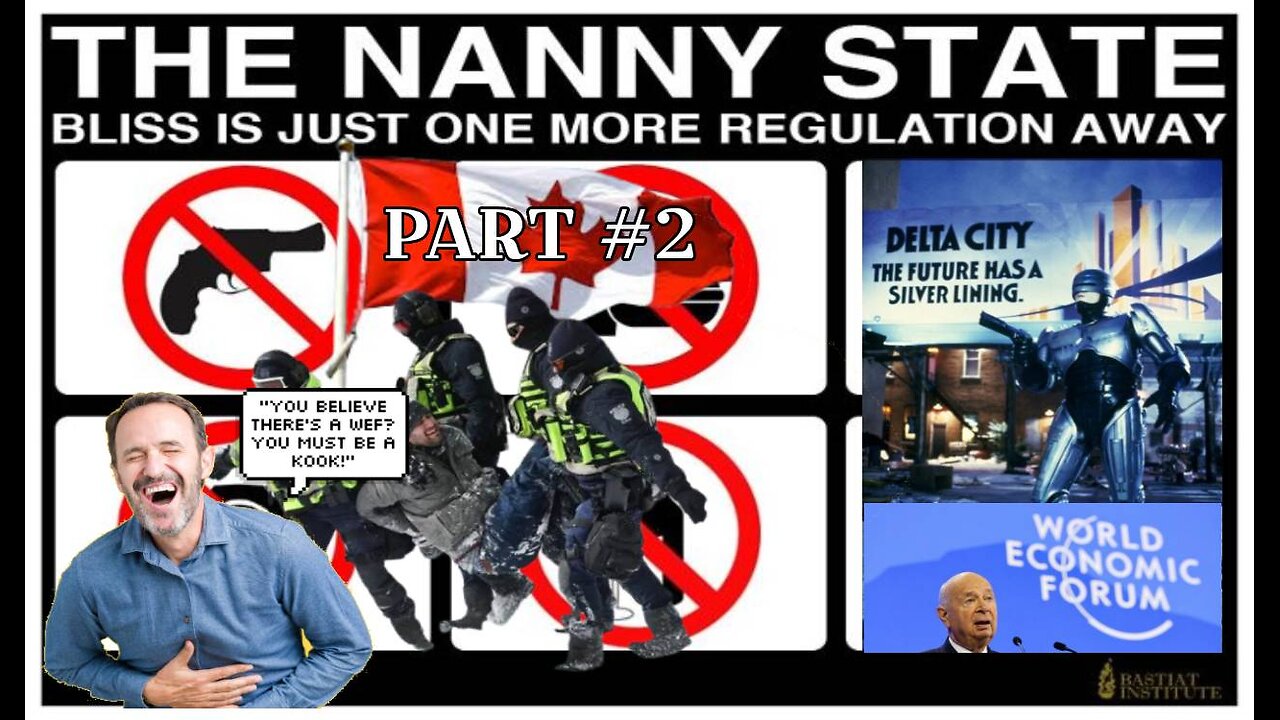Premium Only Content

Ways To Defeat "#nanny state" Mentality: #decentralization Part #2: Media & Futurist Connections
Numerous visionary and dystopian writers, including Aldous Huxley and H.G. Wells, expressed deep concerns about societal transformation, the interplay of past, present, and future, and its implications for individuals. In his seminal work, Brave New World, Huxley highlighted the perils of a technology-dominated society that prioritizes pleasure, warning that such a focus could lead to a decline in individuality and personal freedom. He emphasized that if people choose comfort and happiness over autonomy and critical thought, they risk embracing a life of servitude.
Films, particularly the Robocop series, have long served as cautionary tales, revealing insights from their creators about globalist entities like the World Economic Forum, which were largely unfamiliar to the general public. Discussing "globalism" or suggesting that a small elite might influence global affairs often resulted in ridicule, with critics labeling such views as "kooky" or "conspiracy theories." This dismissive attitude reflects the conditioned responses that the aforementioned authors critiqued in their works.
The Robocop films frequently referenced a fictional city named "Delta City," using it as a metaphor to subtly communicate their awareness of these issues. This approach served two main purposes: it transformed significant information into an entertainment format, thereby fostering a simplistic understanding of complex realities. After consuming media like Robocop or shows such as "The X-Files," how seriously would one be taken if they brought up the World Economic Forum?
Canada has historically upheld some of the most lenient anti-monopoly laws, enabling large multinational and national corporations to exert significant influence over the populace through corporate lobbying at the governmental level.
This dominance has effectively marginalized small to medium-sized businesses, driving out local 'mom and pop' shops and undermining the middle class. In organizational terms, centralization refers to a structure where decision-making power is concentrated at the top, typically with senior management or a single leader, while decentralization spreads this authority across various levels.
Striking a balance between these approaches involves considering factors such as communication efficiency, decision-making speed, and local adaptability.
Given that Canada is a federal state, lawmaking responsibilities are divided among one federal government, ten provincial governments, and three territorial governments. The judiciary plays a crucial role in interpreting and applying the law and the Constitution, ensuring impartial judgments.
-
 6:22:03
6:22:03
SpartakusLIVE
8 hours ago#1 Rocket CHAMPION of Verdansk wields UNSTOPPABLE new META
71.6K5 -
 2:55:11
2:55:11
Barry Cunningham
7 hours agoPRESIDENT TRUMP MADE TODAY A VERY BAD DAY TO BE A DEMOCRAT!
86.8K59 -
 1:15:29
1:15:29
Flyover Conservatives
1 day agoFrom Cool to Cringe: How Democrats Lost America’s Ear | FOC Show
38.5K13 -
 8:19
8:19
MattMorseTV
11 hours ago $4.94 earnedTrump is ACTUALLY DOING IT.
36.5K37 -
 11:30:43
11:30:43
ZWOGs
14 hours ago🔴LIVE IN 1440p! - Tarkov w/ Casey & crgoodw1n, Kingdom Come Deliverance, & More - Come Hang Out!
32.2K5 -
 2:30:56
2:30:56
We Like Shooting
17 hours ago $2.71 earnedWe Like Shooting 625 (Gun Podcast)
28K1 -
 1:45:02
1:45:02
Glenn Greenwald
8 hours agoIsrael Slaughters More Journalists, Hiding War Crimes; Trump's Unconstitutional Flag Burning Ban; Glenn Takes Your Questions | SYSTEM UPDATE #504
132K178 -
 1:29:31
1:29:31
Killerperk
5 hours ago $0.78 earnedRoad to BF6. Come hang out #regiment #bf6
30.2K2 -
 4:35:45
4:35:45
Jokeuhl Gaming and Chat
6 hours agoDARKTIDE - Warhammer 40k w/ Nubes Bloobs and AoA
20.9K2 -
 7:14:12
7:14:12
Cripiechuccles
7 hours ago😁💚💙MOTA MONDAY WITH CRIPIE💚💙 👌SMOKING, GAMING & WATCHING FLICKS!:😁
16.5K3